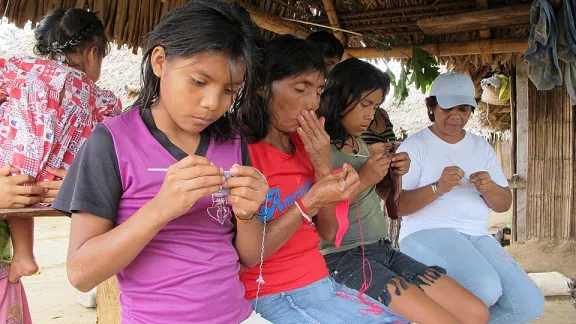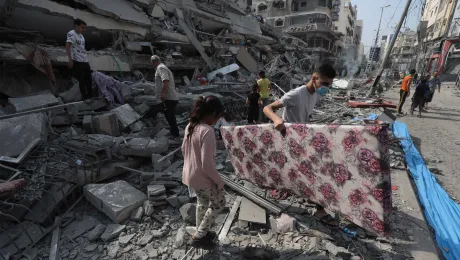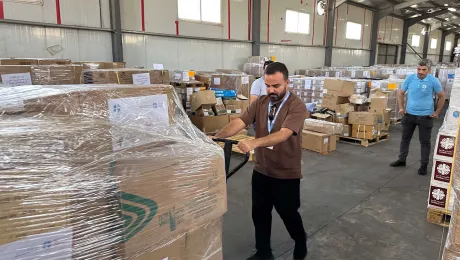
In Arauca Department, the LWF supports indigenous communities' right to food and a dignified life. © LWF/Colombia
LWF Supports Indigenous Communities’ Right to Land and Livelihoods
The road from the city of Arauca to the rural area of Betoyes in northeastern Colombia winds through pastures, rice plantations, some remnants of forest, small parcels of land, oil exploration sites, and includes several military checkpoints.
The Esperanza (Hope) community in Betoyes is one of the reserve areas inhabited by the Makaguan indigenous group. They are among six groups in Arauca who were compelled to move from their ancestral homes because of the protracted armed conflict involving the military, paramilitary and guerrilla groups in the Latin American country over the past four decades. The Lutheran World Federation (LWF) Department for World Service (DWS) program in Colombia has been working with local partners and communities here, with a strategic objective to ensure sustainable livelihoods and food security, and guarantee the civilians’ human rights.
The human rights situation in the country was discussed at a side event organized by non-governmental organizations (NGOs) prior to the United Nations Universal Periodic Review (UPR) of Colombia scheduled for 23 April. The LWF co-hosted the panel discussion jointly organized by a consortium of local and international organizations including the LWF partner International Office for Human Rights Action on Colombia (OIDHACO), on 6 March in Geneva.
A state-driven mechanism, the UPR provides a platform to review the human rights practices of all UN member states once every four and a half years. Prior to the official review, NGOs can influence the process through various interventions.
The 2013 UPR of Colombia includes an assessment on whether recommendations to the country’s first UPR in 2008 have been implemented, and if it is ready to show compliance for its obligations to promote and protect human rights.
OIDHACO’s report on the human rights situation in Colombia between 2008 and 2013 provides a glimpse on the right to life, liberty and security of mainly civilians caught up in a conflict that has displaced between 3.9 and 5.5 million persons since the mid-1960s. It highlights cases that point to impunity by the state, compromised administration of justice and the rule of law, and increasing failure to protect the economic, social and cultural rights of the displaced populations including indigenous people and afro-descendants.
Some Progress, But Need for Continued Advocacy
“From the discussions at the panel last week, it was evident that the Colombian government had made some progress, but there is still a long way to go in several areas. I think particularly of the many internally displaced persons—one out of every ten Colombians. Will they be able to return home safely? And then there are the pressing issues of accountability for human rights violations and de facto impunity of government forces who have committed violations,” noted Mr Ralston Deffenbaugh, LWF Assistant General Secretary for International Affairs and Human Rights.
Deffenbaugh emphasized the need for continued strong advocacy, “especially during this very delicate period” of peace negotiations and continuous fighting. “There is a real danger that even more civilians will be caught up in the conflict,” he added.
Peace talks between the government and the Revolutionary Armed Forces of Colombia began in October 2012.
In Arauca department, the dispute over territory between different armed actors has serious implications for the civilian population, “especially in terms of the right to live and the right to food,” noted Constanza Clavijo Velasco, DWS Colombia program coordinator.
She said that indigenous families who were displaced at the time of Colombia’s first UPR nearly five years ago have not been able to go back to their original homes, despite the Victims and Land Restitution Law mandating their rightful return to land that was illegally appropriated.
In Arauca, where the LWF supports 1,700 individuals, the indigenous land is occupied by armed groups or in some cases by oil and mining companies, therefore affecting the population’s safety, health and food security. Violence against women is particularly widespread, with sexual violence being used as a strategy of war and terror, Clavijo added.
She noted that the current peace talks are a positive step forward, “but it is crucial that the process is built on a solid foundation of respect for human rights and international humanitarian law, and that it seeks to respond to the structural causes of conflict.”
The international community must sustain pressure on the Colombian government so that millions of civilians driven from their lands by conflict can be able to live in their territories in a dignified way, Clavijo emphasized.
In an oral statement delivered on 20 March at the 22 session of the UN Human Rights Council in Geneva, the LWF emphasized that mining constitutes a major threat to indigenous and Afro-Colombian communities and to their land. LWF’s intervention was in response to the report of the High Commissioner for Human Rights on her office’s work in Colombia,
“Large extractive projects are being prioritized by the State over the development proposals put forward by rural communities. The exploitation of natural resources is carried out without prior consultation and without the participation of and sufficient respect for traditional authorities,” said Ms Sofia Nordenmark, presenting the statement that was supported by Church of Sweden and DWS Colombia.
Nordenmark noted that the High Commissioner’s report had made it clear that much work still needed to be done to achieve the full realization of economic, social, cultural and environmental rights in Colombia, which is one of the most unequal countries in Latin America. While the LWF and Church of Sweden welcome the ongoing peace dialogue, “a possible peace agreement needs to address these inequalities in order to be sustainable,” she added.
In a statement at its 2012 Council meeting in Bogotá, the LWF urged Lutherans around the world to engage in stronger advocacy for the churches and people of Colombia. The LWF is present in the country through the Evangelical Lutheran Church of Colombia and the DWS program. [Updated on 21 March]
(The LWF Colombia program contributed to this article.)


